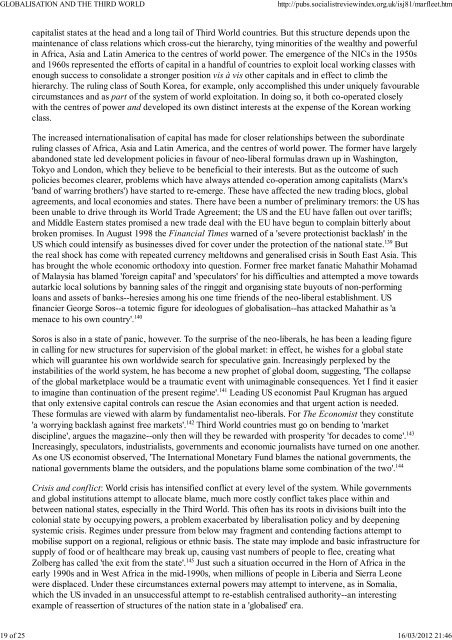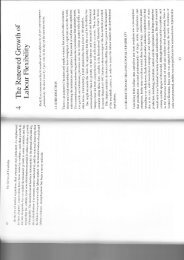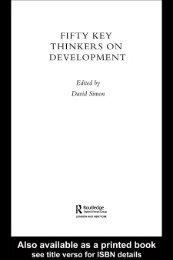GLOBALISATION AND THE THIRD WORLD.pdf - Steerweb.org
GLOBALISATION AND THE THIRD WORLD.pdf - Steerweb.org
GLOBALISATION AND THE THIRD WORLD.pdf - Steerweb.org
Create successful ePaper yourself
Turn your PDF publications into a flip-book with our unique Google optimized e-Paper software.
<strong>GLOBALISATION</strong> <strong>AND</strong> <strong>THE</strong> <strong>THIRD</strong> <strong>WORLD</strong>http://pubs.socialistreviewindex.<strong>org</strong>.uk/isj81/marfleet.htm19 of 25 16/03/2012 21:46capitalist states at the head and a long tail of Third World countries. But this structure depends upon themaintenance of class relations which cross-cut the hierarchy, tying minorities of the wealthy and powerfulin Africa, Asia and Latin America to the centres of world power. The emergence of the NICs in the 1950sand 1960s represented the efforts of capital in a handful of countries to exploit local working classes withenough success to consolidate a stronger position vis à vis other capitals and in effect to climb thehierarchy. The ruling class of South Korea, for example, only accomplished this under uniquely favourablecircumstances and as part of the system of world exploitation. In doing so, it both co-operated closelywith the centres of power and developed its own distinct interests at the expense of the Korean workingclass.The increased internationalisation of capital has made for closer relationships between the subordinateruling classes of Africa, Asia and Latin America, and the centres of world power. The former have largelyabandoned state led development policies in favour of neo-liberal formulas drawn up in Washington,Tokyo and London, which they believe to be beneficial to their interests. But as the outcome of suchpolicies becomes clearer, problems which have always attended co-operation among capitalists (Marx's'band of warring brothers') have started to re-emerge. These have affected the new trading blocs, globalagreements, and local economies and states. There have been a number of preliminary tremors: the US hasbeen unable to drive through its World Trade Agreement; the US and the EU have fallen out over tariffs;and Middle Eastern states promised a new trade deal with the EU have begun to complain bitterly aboutbroken promises. In August 1998 the Financial Times warned of a 'severe protectionist backlash' in theUS which could intensify as businesses dived for cover under the protection of the national state. 139 Butthe real shock has come with repeated currency meltdowns and generalised crisis in South East Asia. Thishas brought the whole economic orthodoxy into question. Former free market fanatic Mahathir Mohamadof Malaysia has blamed 'foreign capital' and 'speculators' for his difficulties and attempted a move towardsautarkic local solutions by banning sales of the ringgit and <strong>org</strong>anising state buyouts of non-performingloans and assets of banks--heresies among his one time friends of the neo-liberal establishment. USfinancier Ge<strong>org</strong>e Soros--a totemic figure for ideologues of globalisation--has attacked Mahathir as 'amenace to his own country'. 140Soros is also in a state of panic, however. To the surprise of the neo-liberals, he has been a leading figurein calling for new structures for supervision of the global market: in effect, he wishes for a global statewhich will guarantee his own worldwide search for speculative gain. Increasingly perplexed by theinstabilities of the world system, he has become a new prophet of global doom, suggesting, 'The collapseof the global marketplace would be a traumatic event with unimaginable consequences. Yet I find it easierto imagine than continuation of the present regime'. 141 Leading US economist Paul Krugman has arguedthat only extensive capital controls can rescue the Asian economies and that urgent action is needed.These formulas are viewed with alarm by fundamentalist neo-liberals. For The Economist they constitute'a worrying backlash against free markets'. 142 Third World countries must go on bending to 'marketdiscipline', argues the magazine--only then will they be rewarded with prosperity 'for decades to come'. 143Increasingly, speculators, industrialists, governments and economic journalists have turned on one another.As one US economist observed, 'The International Monetary Fund blames the national governments, thenational governments blame the outsiders, and the populations blame some combination of the two'. 144Crisis and conflict: World crisis has intensified conflict at every level of the system. While governmentsand global institutions attempt to allocate blame, much more costly conflict takes place within andbetween national states, especially in the Third World. This often has its roots in divisions built into thecolonial state by occupying powers, a problem exacerbated by liberalisation policy and by deepeningsystemic crisis. Regimes under pressure from below may fragment and contending factions attempt tomobilise support on a regional, religious or ethnic basis. The state may implode and basic infrastructure forsupply of food or of healthcare may break up, causing vast numbers of people to flee, creating whatZolberg has called 'the exit from the state'. 145 Just such a situation occurred in the Horn of Africa in theearly 1990s and in West Africa in the mid-1990s, when millions of people in Liberia and Sierra Leonewere displaced. Under these circumstances external powers may attempt to intervene, as in Somalia,which the US invaded in an unsuccessful attempt to re-establish centralised authority--an interestingexample of reassertion of structures of the nation state in a 'globalised' era.




